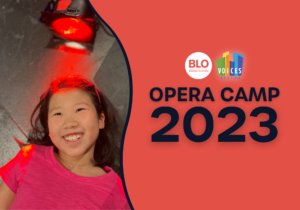Welcome to CODA! Coda comes from the Latin word for “tail,” and in music, it indicates an additional passage at the end of a piece of music, a final flourish that compliments what’s come before. CODA goes beyond the curtain call to explore this unique and astonishing art form. Whether you’re a first-time opera-goer or a seasoned audience member, CODA is for you.
Attention parents: enrollment in our annual Opera Camp has begun! In collaboration with our friends at VOICES Boston, Opera Camp is designed for rising 3rd-9th graders who have an interest in all things music, singing, and acting.
This one-week day-camp gives elementary and middle school youth the opportunity to learn about how an opera is created—from writing a libretto, to composing music, to technical theater—and work together to create their own original opera! Led by our BLO Master Teaching Artists, students will have the opportunity to earn about opera, create their own musicals, perform their own original songs. They’ll also discover the magic that happens backstage by designing and creating costumes, props, sets, and lighting.
Not sure if your Opera Camp is right for your budding opera fan? Keep reading to find out how hands-on music education can enrich your child’s life.

Music is good for their brain (and yours!)
It’s undeniable that music is good for your brain’s health. Anyone learning music taps into multiple skill sets, often simultaneously. The brain of a musician, even a young one, works differently than that of a non-musician, and musical training in children results in long-term enhancement of visual-spatial, verbal, and mathematical performance. Consistent music education is even associated with higher test scores, better performance results on concentration-based tasks, and even basic memory recall. But the benefits don’t end with brain health.
Enhance their emotional regulation
The best reason to make music (or listen to it) is its effect on our quality of life. You may know that music promotes stress relief, but it’s about more than just relaxation. If you’ve ever cried at the end of La Bohème or felt fear when you heard the Imperial March, you know the power of musical catharsis. Music can help channel a child’s frustration and purge negative emotions like anger or grief. In turn, listening to something like Die Fledermaus can have the power to turn their day around, lend them some energy, and promote positive emotions.
Create a community
Whether it’s through school programs, community ensembles, or even informal jam sessions, the act of making music together brings people from diverse backgrounds and experiences together in harmony. Through shared melodies and rhythms, children forge connections that extend beyond the rehearsal, creating lasting friendships and a support system that uplifts and encourages one another. By participating in music education, children not only learn to play an instrument or sing, but also to cultivate teamwork, collaboration, and empathy. They gain a profound understanding of the value of cooperation and learn to listen attentively, respect one another’s contributions, and work towards a common goal. Music education creates a vibrant and inclusive community where everyone is welcome, and the joy of music is shared by all.
Role models matter
A positive role model can be an important motivator in a child’s life, and our BLO Master Teaching Artists serve as exemplars of artistic achievements, inspiring children to aspire to greatness and helping shape their own identities. By observing and interacting with positive role models, children gain valuable insights into the qualities and skills necessary for success in the arts and in life. Role models can instill confidence, foster ambition, and nurture a sense of purpose in children, as they witness firsthand the transformative power of hard work, perseverance, and resilience. Moreover, role models often embody values such as integrity, empathy, and compassion, teaching children about ethical behavior and social responsibility. Role models like our teaching artists play a vital role in shaping the moral, intellectual, and emotional development of children, helping them become well-rounded individuals who contribute positively to society.
The perfect duet
Sharing common interests creates a strong bond between parents and children, and Opera Camp is a perfect way to connect with your child over your shared love of music. When parents introduce their passions to their children, their shared interest can become a foundation for building a close and open relationship, as it provides a platform for communication and understanding. If you love opera because your grandparents played Mario Lanza when you were growing up, you know that a love of music can also be a way to preserve family heritage. By sharing these interests, parents ensure that their legacy is carried on and celebrated by future generations, and that opera will have a faithful audience for years to come.
Opera Camp runs August 14th-18th, 9:30am-4:30pm (before and after care is available). Click here for more information!
We are proud to announce our 2023/24 mainstage season: Madama Butterfly, La Cenerentola (Cinderella), The Anonymous Lover, and Eurydice. Join us for a season that explores the power, depth, and complexity of our most human of emotions: love.
Want to learn more? Sign up for our mailing list to stay up to date on all things BLO.
